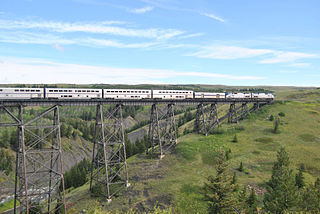Happening Now
The long term rides on the rails
January 13, 2014
Written By Colin Leach

Political scientists and public policy scholars have often spoken of a particular problem that vexes policymakers, politicians, and the general public. “Short-termism”, as it is termed, refers to the unique combination of politics and political economy that puts a premium on actions for the benefit of the here and now. Politicians, more interested in immediate results for political advantage, often embrace policies that are not necessarily sustainable in the long term.
Balanced transportation advocates understand well the problems of short-termism; our present transportation system is a testament to the predominance of short-term thinking. By choosing to prioritize investment in highways and aviation over our railroad network, politicians have created gridlock on the roads and in the skies. To add insult to injury, short-termism has also denied Americans living in rural areas and smaller cities transportation choices. As we’ve reported to you on many occasions, airlines and large bus companies are rapidly exiting smaller markets for cost reasons.
Millions of Americans should not be left stranded because of political maneuvering. That’s one of the many points Amtrak CEO Joe Boardman has consistently raised in his congressional testimonies and public statements. As Frank Wilner wrote in his recent editorial, Boardman represents an anomaly among today’s business leaders. In a climate where there is a veritable “obsession” with maximizing returns on investment as well as rising stock prices, Boardman’s continued insistence on the need for capital investment makes him seemingly unique in the modern political climate.
Yet is it odd to call for increased federal investment in transportation? Boardman would say no. Since the foundation of the republic, he observes, the federal government has always committed itself to investment in capital-intensive transportation projects. Whether it was the National Road in 1811, the Transcontinental Railroad in the 1860s, or the Interstate Highway System of the 1950s, the federal government has long recognized that infrastructure is at the heart of our economic growth.
Unfortunately, that commitment has been undermined by political factors. Boardman decries lawmakers’ apparent focus on “issues of the moment” rather than “issues of the century”; a preoccupation that causes them to ignore our “literally crumbling infrastructure.”
Let’s consider an example of what he means. Amtrak, as we know, has seen record ridership numbers in the past few months; and with good reason. Americans appreciate having travel choices and realize that passenger trains offer a fast and stress-free alternative to highways and airports. But Amtrak’s ability to grow and succeed is limited by the reality that the railroad is “living on investments made as far back as the Civil War”. The tunnels that carry the heavily-used Northeast Corridor through Baltimore and under the Hudson River date back to 1873 and 1910 respectively, and are in dire need of replacement. Lack of political will to make the necessary capital investment, however, has repeatedly postponed these projects. If we are to look towards the future, Boardman argues, lawmakers must “find the courage to figure out a solution to our 21st century needs.”
Fortunately, Americans understand well that our lawmakers need to find that courage. They show that comprehension each and every time they climb aboard one of Amtrak’s trains. Whether they’re hopping on the Silver Meteor to Miami or the Illinois Zephyr to Quincy, millions of Americans experience “a different mobility” each and every day. Americans know that we must do more to improve our transportation choices; more trains won’t happen without increased investment.
NARP has been at the forefront of advocacy for long-term investment in the transportation network of tomorrow. We’ve made consistent stands for an expanded passenger train network that serves all Americans, and have also called on Congress to use the upcoming Passenger Rail Investment and Improvement Act reauthorization as an opportunity to plan for the decades to come. And, of course, we’ve testified in Congress on the need to defend long-distance trains as the core of a truly national network.
Ignoring our long-term transportation needs won’t make them go away, it’ll just make them harder to fix. To plan for the network of the future, we must begin now.
"When [NARP] comes to Washington, you help embolden us in our efforts to continue the progress for passenger rail. And not just on the Northeast Corridor. All over America! High-speed rail, passenger rail is coming to America, thanks to a lot of your efforts! We’re partners in this. ... You are the ones that are going to make this happen. Do not be dissuaded by the naysayers. There are thousands of people all over America who are for passenger rail and you represent the best of what America is about!"
Secretary Ray LaHood, U.S. Department of Transportation
2012 NARP Spring Council Meeting
Comments